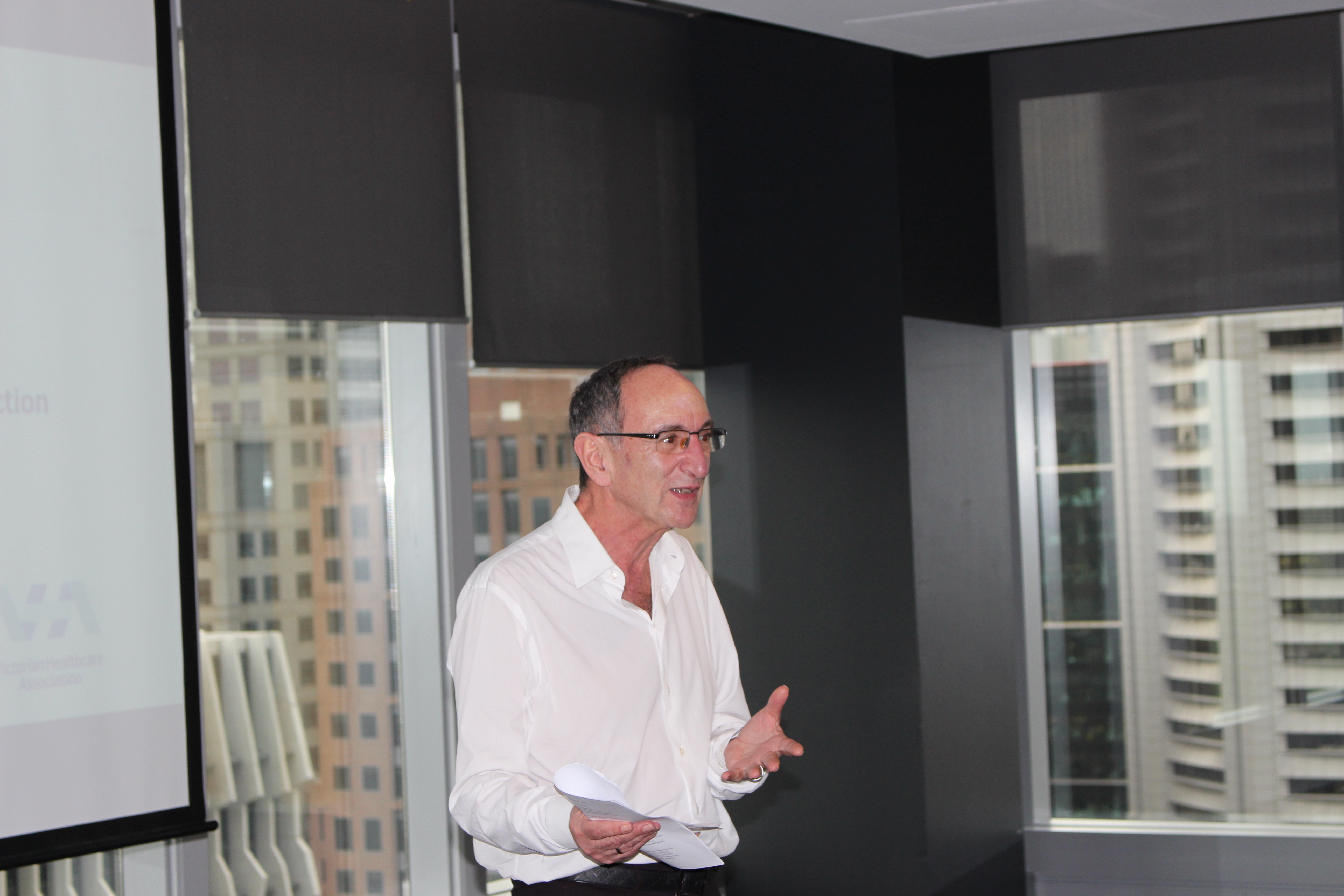Thank you to everyone who contributed to our most successful AHN event to date. The quality of the conversation and the energy was outstanding. Special thanks must go to our panel and sponsors, Slater and Gordon. So what happened and what did we think about? Top 4 points are below. We need to keep our eye on both the incremental improvement and on the more flashy innovations (the split screen analogy) The people we engage with in our exploration and search for opportunities to innovate our health system are really important. We need to consider the context we are seeking to change, those that are willing to be involved and those who bring fresh eyes to the situation when constructed a team There is no magic bullet to solve the challenges of our health system. We need the full package of ‘C’s; collaboration, curated spaces, change of culture, conceiving of conceptual ideas and in the end we may get change
Australian Health Network
Disruptive innovation; is our health system ready for the next wave of innovation?
The AHN and our sponsors Slater and Gordon, are delighted to invite you to join the conversation on healthcare disruption. Will we see an uber in healthcare? The US is certainly leading the way with the advent of organisations such as Pager which delivers on demand medical services for a price (). Here in Australia we have start ups making a mark and a growing willingness for our health care system and its organisations to think outside the box. However, is it enough to meet the economic and social challenges ahead? Please join us for an invigorating conversation with our leading panel: · David Albury, thought leader and experienced global innovator · Vishaal Kishore, Chief Strategy Officer Launch Vic · Andrew Lin, CEO of clinicloud · Bernadette McDonald, Deputy Chief Executive Officer and Executive of Performance and Innovation, Austin Health The Event is on the 24th October at 5.30. If you would like to join please get in contact via healthnetwrk@gmail.com
Digital Transparency wrap up
We had a brilliant conversation at EY on the 18th of August with Tim Kelsey (current CEO Australian Digital Health Agency), Richard Royle (former CEO Australian Digital Health Agency), Kirsty Elderton (Futuregov) and Andrew Way (CEO of Alfred Health) and we are sorry you missed it. The following points are a brief summary of the engaging conversation that transpired: 1. The sole purpose of open data and better transparency in health is to improve the quality and safety of patients; 2. Making data available alone is not sufficient – we must consider how meaningful it is, paying particular attention to the way it is presented for consumption; and 3. There were many powerful anecdotes including an example of low tech transparency in India that has saved substantial amounts through fraud prevention. Should you wish to know more about what Tim Kelsey, CEO of the Australian Digital Health Agency, has to say, please click on this link
Digital Transparency
The AHN, and our sponsors EY and the Melbourne School of Government, are delighted to invite you to our next event focused on Data Transparency and Openness in the Health System. Please join us to hear from our expert speakers; Tim Kelsey, formerly the National Director of Patients and Information for the NHS in England and previously commercial director at Telstra Health. Tim is a leading advocate of a popular knowledge revolution in health services and, in 2000, was co-founder of Dr Foster, a company which pioneered publication of patient outcomes in healthcare. Richard Royle, former CEO of the Australian Digital Health Agency (ADHA), will also be joining us. Among many roles he has overseen the successful development and opening of Australia’s first fully integrated digital hospital in Hervey Bay in 2014, and in 2013 undertook the role of chairing an independent review into the Personally Controlled Electronic Health Record on behalf of the Federal Government. Kirsty Elderton, Head of FutureGov Australia, is a leading digital government specialist with a background in public service organisational design, innovation and change. FutureGov Australia has delivered a number of successful projects of late; Patchwork which is a collaboration tool for multi-agency working across Victoria and NSW and Casserole Club which is a micro volunteering platform that connects people who loves to cool with older neighbours who would value a home cooked meal and some company. Andrew Way, CEO of the Alfred Health will moderate the conversation.
Open and Transparent Data: what is the impact on health systems?
From the 1st of July this year Victoria’s public health services and denominational hospitals will be required to publish their statements of priority annually and they will also be required to provide a quarterly release of health performance data based on key performance indicators in the statement of priorities. The aim is to provide the public with information about the performance of their hospitals. Currently Data on health is available via the Data.vic () and on the Department of Health website () . A few hospitals also publish their own data on local websites. The purpose of greater transparency of health services data has been well documented. It has been demonstrated, or there is emerging support, that the following are the result of open data in the health sector: Increased accountability of the regulators Enables the choice of the public as to which public service to attend By comparing data between hospitals it can drive productivity Increase the quality of care An opportunity for social innovation as entrepreneurs use data to create apps Our event in August is focused on the impact of increasingly open and transparent data for the health system in the era of big data.
In a high performing organisation what is the role of the medical staff?
26th May 2016 at 5.30-7.30 pm There is much written about the role of doctors within hospitals and the degree to which they are engaged with these organisations and the wider system. Often discussions about these issues are couched in terms of issues of medical leadership and the need to get more doctors into formalised management and leadership roles within health care organisations. Professor Peter Spurgeon is one of the developers of a novel scale, the Medical Engagement Scale. It is being used internationally and here in Australia. Erwin Loh Chief Medical Officer from Monash Health will be providing the Victorian perspective and Paul Long will be providing the National view. Please join us for a stimulating and exciting event with the opportunity to challenge and think about this key challenge within the health sector.
Peter Spurgeon to join us for an evening
Professor Peter Spurgeon, one of the developers of the the Medical Engagement Scale (MES) and founder of the Institute of Clinical Leadership at Warwick Medical School, UK will be joining us on the 26th May from 5.30 in Melbourne. Stand by for the Eventbrite invitation!
Measuring medical engagement: The new leadership challenge?
There is much written about the roles of doctors within hospitals and the degree to which they are engaged with these organisations and the wider system. Often discussions about these issues are couched in terms of issues of medical leadership and the need to get more doctors into formalised management and leadership roles within health care organisations. Recent research on this topic from the UK and more recently Australia seems to suggest that this leadership aspect will only get you so far in achieving the engagement of doctors. The real challenge for health organisations and health leaders is about how we engage the broader medical workforce and not simply a few doctors in formalised management roles. The biggest challenge for health organisations over the next decade or so concerns how organisations can engage doctors more fully to ensure that resources are used as efficiently and effectively as possible. In studying medical engagement I have used an interesting scale – the Medical Engagement Scale (MES) – as a way of measuring the degree to which doctors feel engaged with their organisations. This has now been used in a number of hospitals across different countries and the datasets around it provide a fascinating snapshot into engagement levels of doctors within health organisations. Professor Peter Spurgeon was one of the developers of the MES and we have worked together on a few research projects in the UK. One of his colleagues, Paul Long is based in Australia and I recently had the pleasure of starting to work with him on this area. Paul has a fantastic wealth of data on engagement and experience of working with doctors and health organisations. What is interesting is we have worked on this topic collaboratively and separately and cover a number of different facets of the medical engagement agenda. Peter is coming out to Australia soon and this provides us with a great opportunity to bring together our knowledge and think about what the evidence demonstrates in terms of engagement. We will be doing day long masterclasses in Sydney and Melbourne that will be limited in size so we can delve into the issues in detail with delegates and make discussions useful and relevant to the organisational contexts of those who partake. You can find out more about these events in this medical leadership event flyer and can book for Melbourne and Sydney in the respective links.
Healthcare Innovation wrap up
Our speaker, David Albury, shared his expertise and experience in Innovation across the breadth of the public sector with an avid audience at EY in Melbourne on the 19th November. Many questions came from the floor with varied angles including the influence of markets and a discussion of the role of the population itself has in the deliver of innovation through co-design. A big thank you must go out to our supporters for this event; EY, Australian Healthcare Association and of course the Melbourne School of Government.
Bridging the gap between creation & application of knowledge
The Office of the Chief Scientist recently published a report on knowledge creation and application in the context of entrepreneurship. It argues that knowledge is ‘the foundation of the highgrowth industries of the future’ (pg. iv). Given that Australia is currently going through somewhat of a transition in terms of the structure of its economy then this is an important issue for the country. To some degree Australia is well placed for this future in terms of its share of the world’s top 1 per cent cited research papers in STEM (Science, Technology, Engineering and Maths) areas. But overall the country is far more weak at bridging the gap between the creation of this knowledge and its application. Australia places ninth for the quality of scientific institutions and only 72nd on Innovation Efficiency (output innovation relative to input in terms of the Global Innovation Index. No Australia Universities place in Reuters’ ranking of top 100 innovative universities. Fewer than one in two Australian businesses report innovative activity of any kind. This report is not an anomaly and other studies reveal similar patterns. For example, the OECD ranks Australia last in terms of relationships between universities and businesses. During a debate at the Melbourne Institute conference last week, the Prime Minister Malcolm Turnbull noted that other countries with similar academic cultures are ‘well ahead’ on industry engagement with university research. Such a state of affairs is depressing for those with an interest in innovation and entrepreneurship, but also offers a huge opportunity to advance this agenda. It seems that in driving this agenda there are two things that are agreed upon. The first is that the journey from knowledge creation to its implementation is not straight forward. This process involves navigating a whole series of different organisations, interests and values. The second point that is agreed on is that universities are central to this process. The recent introduction of Advanced Health Research and Translation Centres to Australia may be one way these activities may be improved in the context of health care. Modelled on experiences in the UK, Canada and the US, these centres bring together universities, health organisations and clinical professionals to focus on producing high quality research and mobilising this into practice. At the University of Melbourne we have a project seeking to evaluate these organisational arrangements as they develop and you should see a report from us on this soon. The Victorian Health Network is another innovation that seeks to support the mobilisation of knowledge, particularly in relation to systems improvement. We believe that knowledge is best mobilised where it is socialised between different actors within a system. By bringing together senior individuals from across the health system with an internationally renowned speaker, we believe this affords the system the opportunity to learn from the best and to think about how it mobilises this knowledge into practice. The first VHN event takes place next week and we have just a few places left. We will be hearing from David Albury on the topic of ‘Health Innovation: From buzzword to disciplined action’. If you are interested in attending then drop us a line to find out more.
The Downing Lecture 2015: Integrating Health Care Financing and Delivery: the US experience
The Downing Lecture 2015 looks really interesting. Titled Integrating Health Care Financing and Delivery: the US experience and presented by Dr Joseph Newhouse will no doubt provide a perspective that will be fascinating to those considering the play between active management of care choices and those that don’t. Looks great will hope to see you there! Details about how to register can be found here. Health Care Financing and Delivery: the US experience












